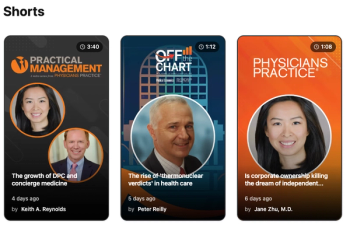
3 Ways to boost your practice’s online reputation
Maintaining your practice's online reputation can be a key to growth.
Reputation management is a crucial component for independent practices to thrive. An effective reputation management strategy will drive new patient acquisition and patient retention and strengthen patient-doctor relationships. It should be no surprise to learn that healthcare practices already using technology to engage with current and prospective patients are well-positioned to build connections and provide better care.
According to our
1. Claim and optimize your practice and business profiles across the web
Make it easy for patients to find you via search engines by claiming all available business profiles. There are dozens of websites and healthcare directories that provide local listings. Google, Yelp, WebMD, Healthgrades, and Facebook are a few, with Google being the most popular. Google business listings consistently own
To boost your visibility and bring your practice to life, add photos that spotlight your practice and the patient experience you provide. The more pictures you upload, the more opportunity you have to give prospective patients a peek into your office. To differentiate yourself from competitors, use your profile to share why patients choose your practice.
2. Leverage word-of-mouth marketing and use online reviews
The best marketing will always be word-mouth because consumers trust each other over what businesses say about themselves. Online reviews are the digital version of word-mouth marketing and improve your business reputation because positive reviews signal your practice is relevant and a real place. Moz says that, of the 83 factors that affect search, two of the top 20 are related to the volume of reviews your practice receives. So the more reviews your practice has, the better position will be in search results.
Our latest research shows that about 69 percent of patients will not consider a provider with an average rating below four. To start receiving more reviews and appealing to prospective patients, a digital approach to collecting online reviews will allow you to monitor feedback at a larger scale and efficiently manage the process. When implementing an automated online review strategy, consider the three factors that have the highest impact on your online reputation, including the total number of reviews, the frequency of reviews, and the average star rating. Sending automated patient satisfaction surveys via text or email soon after the appointment will increase the likelihood of receiving feedback and reviews consistently. Not only do reviews improve your online reputation for others to see, but reviews also provide insight for you into what is going well at your practice and areas you may need to focus on more. While most incoming reviews will likely be positive, if you do receive a negative review, you have an opportunity to make changes, re-engage with that patient, and regain trust.
3. Fully optimize your healthcare website
Having a mobile-first site is extremely important. According to
In addition to a mobile-first approach, your website should provide a pleasant experience and invite users to engage and interact with your practice. By delivering relevant content and new information about your services, visitors will spend more time on your site, leading to a higher conversion rate. Your website should also include strong keywords throughout the content, sticky calls-to-action to convert visitors into patients, SEO-friendly content pages, and lightning-fast speeds.
Your online reputation and website are crucial to your practice growth strategy in today's digital-first world and should be reviewed and updated regularly. There are multiple components to an effective method for building and maintaining your online reputation. Implementing the above strategies is a great start to taking control of your digital footprint and growing your practice.
Travis oversees all aspects of strategy, sales, and business development at PatientPop, a Tebra company. Before co-founding the company, Travis co-founded and served as the CEO of ShopNation. He also co-founded and served as the CEO of StarBrand Media. Travis holds an Honors degree in Business and Economics from Wilfrid Laurier University. He is also a two-time recipient of the KPMG Enterprise Entrepreneur Award.
Newsletter
Optimize your practice with the Physicians Practice newsletter, offering management pearls, leadership tips, and business strategies tailored for practice administrators and physicians of any specialty.






